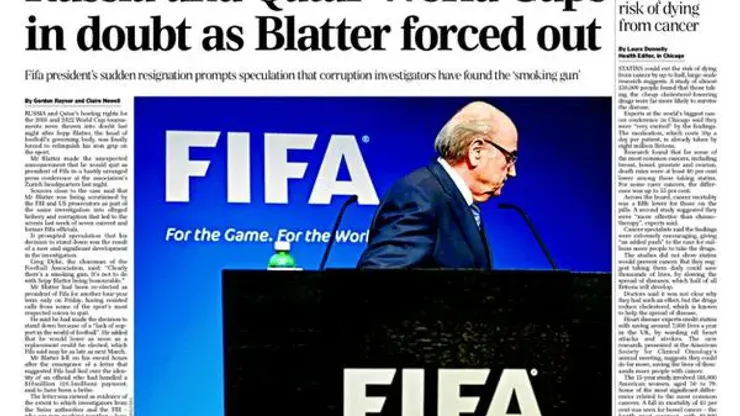The shockingly sudden resignation of Sepp Blatter as head of FIFA prompts a number of questions, many of which are a long way from being answered. Some will remain unanswered until the prosecutors and various police forces announce the results of various investigations, but practically there is now a major question that needs to be answered, as it may have precipitated the whole take-down:
What about the 2018 and 2022 World Cups?
Those events that brought to light the true depth of potential corruption and emboldened journalists to dig deeper into FIFA’s practices were to be, with the South Africa World Cup, the legacy of Sepp Blatter. These three World Cups were his attempt to bring the world’s game to the world – showing that countries outside the First World (and Russia) could be appropriate venues for such a spectacle. However, with Blatter gone in a cloud of disrepute, what should be done about the next two World Cups?
Although the process for replacing the FIFA president is still fluid, we have a point man for how the FIFA changes will begin. Domenico Scala, chair of the independent Audit and Compliance Committee, will begin implementing the changes to the Board as well as the organization’s management. In his speech to the media today, he gave some hints at what will be priorities, but mainly the focus was the structure of FIFA and the executive committee. Understandably, he is beginning reform at its absolute base but the question of the results of the corruption must be answered. In addition, making swift bold statements on the upcoming World Cups could send a powerful message to those watching to see if the reforms will be real – FIFA cares about transparency, to the point we will hurt ourselves to get things right.
What should be done about these World Cups? Practically, not much could be done about the 2018 World Cup. With the event three years away and Russia having already invested millions into preparing, to pull the World Cup out would be cruel to a nation that has already done so much advanced planning. However, that does not mean FIFA cannot threaten to do so and extra major concession from the host nation. For example, a clean FIFA should insist the Russian FA ensure a politically neutral event, open to all nations that qualify as well as the players of those nations. Much like the Socchi Olympics, Russia should ensure the World Cup is a free and open event to all, with no fear of reprisal for what is written or beliefs held. In addition, FIFA and UEFA should immediately send an independent audit committee to the FA offices to check the books and henceforth insist that any deals to prepare for the World Cup meet the high standards FIFA now holds itself to.
Qatar on the other hand should be immediately held open to a revote. The farce that was the biding process should be a sin confessed immediately and, as a mea culpa, FIFA should open the bidding process to all confederations. By creating a structure where clean confederations can propose 2-3 host nations each, and FIFA establishes a transparent process to consider each bid before naming a host, the machinations of the Qatar bid can be atoned for. Qatar can even resubmit a bid, and if selected, it will have exonerated itself through a clean process. To atone for the sacrifices made in the name of their mistakes, FIFA should dedicate the 2018 games to those who dies in Qatar and South Africa in the name of soccer.
By taking these two steps – forcing Russia to abide by an open and ethical World Cup, and revote on the 2022 tournament – can FIFA make a definitive statement that its reforms are real, and the governing body is capable of making the changes needed to manage the beautiful game.
Will all of this happen? I find it unlikely. However, last night I was sharing my opinion that Sepp Blatter would escape unscathed in these indictments. World soccer is changing quickly, and time will tell if this time it is truly for the better.
[interaction id=”556e4a9061d08a2d4b855558″]
200+ Channels With Sports & News
- Starting price: $33/mo. for fubo Latino Package
- Watch Premier League, Women’s World Cup, Euro 2024 & Gold Cup
The New Home of MLS
- Price: $14.99/mo. for MLS Season Pass
- Watch every MLS game including playoffs & Leagues Cup
Many Sports & ESPN Originals
- Price: $10.99/mo. (or get ESPN+, Hulu & Disney+ for $14.99/mo.)
- Features Bundesliga, LaLiga, Championship, & FA Cup
2,000+ soccer games per year
- Price: $5.99/mo
- Features Champions League, Serie A, Europa League & Brasileirāo
175 Premier League Games & PL TV
- Starting price: $5.99/mo. for Peacock Premium
- Watch 175 exclusive EPL games per season






